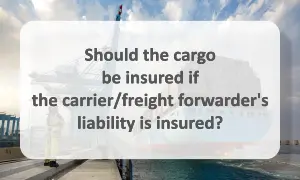Should the cargo be insured if the carrier/freight forwarder's liability is insured?

All transportation operations related to cargo transportation are inextricably linked to damage, loss or destruction of cargo as a result of various circumstances. In the civilized world transportation of cargoes without insurance is practically impossible, so most of the companies choose to pay a small insurance premium compared to the real value of the cargo, so that in case of problems with the cargo to solve them at the expense of insurance.
Quite often it is possible to hear a wrong judgment from cargo owners that if the carrier's liability is insured, then in case of unsafe delivery of cargo - the cargo owner will receive compensation in any case and accordingly the question may arise - whether it is necessary to additionally insure their cargo?
This situation today is very relevant for many cargo owners who want to save money on insurance. Therefore, I would like to analyze this issue in more detail.
- In fact, these are completely different types of insurance, with different objects and conditions: cargo insurance protects the interests of the cargo owner; under the insurance of the carrier's/forwarder's liability for the safety of the cargo is meant coverage of risks associated with the fulfillment of their contractual obligations to the client.
- It should be noted that the carrier/freight forwarder will only be liable to pay damages where his liability arises. In particular, he is exempt from liability for loss of or damage to the goods, as well as for delay in delivery of the goods, if they occurred through no fault of his, or circumstances, the consequences of which the carrier could not have prevented. This means that for the loss of cargo caused by natural disasters and force majeure, the carrier, according to the law, in the vast majority of cases, is not liable at all, and compensation for damage as a result of traffic accidents, theft of cargo, etc. is made only in the case of proven (most often in court) responsibility of the carrier / forwarder. In maritime transportation, the Hague Rules stipulate 17 situations in which the shipowner is not liable for the cargo to the cargo owner. This means that in certain situations it is impossible to claim damages from the shipowner. However, it is often difficult and time-consuming to obtain compensation from the carrier.
- It is necessary to mention the limitation of the carrier's liability limit. For example, in international road transportation, the liability of carriers is limited by the International Transport Convention (CMR), according to which the limit of liability is limited to the amount equal to 8.33 SDR/SPZ per gross weight of 1 kg of cargo. In case of sea transportation according to the Hague Rules and COGSA (Carriage of Goods by Sea Act) the shipowner's liability is not more than USD 500 per unit. That is, this limit may not be enough to cover cargo damage.
- It can also be added that in most cases, the carrier is exempted from liability for damage or loss of cargo, if it was due to loading, stowage, unloading or handling of the cargo by the sender or receiver. Cargo insurance covers these risks.
- Also, unlike carrier/freight forwarder liability insurance, cargo insurance provides protection against financial claims that may be made against the owner of the cargo in maritime transportation in the event of a declared General Accident, even in cases where the cargo itself is not damaged.

Summarizing all of the above, it is reasonable to conclude that only cargo insurance provides maximum coverage of cargo damage risks during its transportation, and carrier's or forwarder's liability insurance should be considered as an additional guarantee of their solvency to the cargo owner.
General Accident is a loss incurred as a result of extraordinary expenses and donations made intentionally and reasonably to save the ship, freight and cargoes being transported from a common peril. These losses are shared between the shipowner, cargo owners, regardless of whose cargo was donated.
5 tips for car tourists (Green Card)
5 Tips for Car Tourists (“Green Card”). To ensure that your car trip abroad goes smoothly, consider these 5 tips from MTIBU Director General Volodymyr Shevchenko on how the international system of motor third party liability insurance “Green Card” works. Tip #1. Preparation is half the battle. When you plan to travel abroad by car, take care not only of preparing your own documents, but also check in advance whether you will be able to cross the border. One of the prerequisites for crossing the border for a car owner is a valid Green Card certificate. It is better to buy it at the offices of full MTIBU member insurers that have the appropriate license, rather than relying on the possibility of concluding a contract directly at the border. Today, 10 insurers have the right to conclude such contracts. Important: the Green Card policy is concluded in paper form; there is no electronic version of the policy yet. Tip #2. It is better to overpay than to get a fine There are two…
New technologies in life insurance
The insurance market is becoming increasingly digital. More and more insurance products are being sold online, remote claims settlement services are being developed, and new insurance products are being offered. Against this backdrop, the life insurance segment stands out somewhat, driven by savings and investment insurance products. Obviously, these are not the types of insurance that can be successfully marketed remotely through online channels due to individual customer requirements and the need for professional advice from the insurer. However, innovative technologies in the insurance sector - InsurTech - make it possible to…
How much are overpaying for policies?
Generosity of insurers: how much do people overpay for policies? Services for the sale of policies to insurers themselves cost 241.4 billion rubles in the first nine months of 2019. Banks earned more than others, whose commissions reached 150.5 billion rubles - the same amount as for the whole of 2018. And they were ultimately paid by insurance buyers. Consumers have a choice: they can buy a policy in the office of the insurer, on its website, from an agent or from a bank. The…


